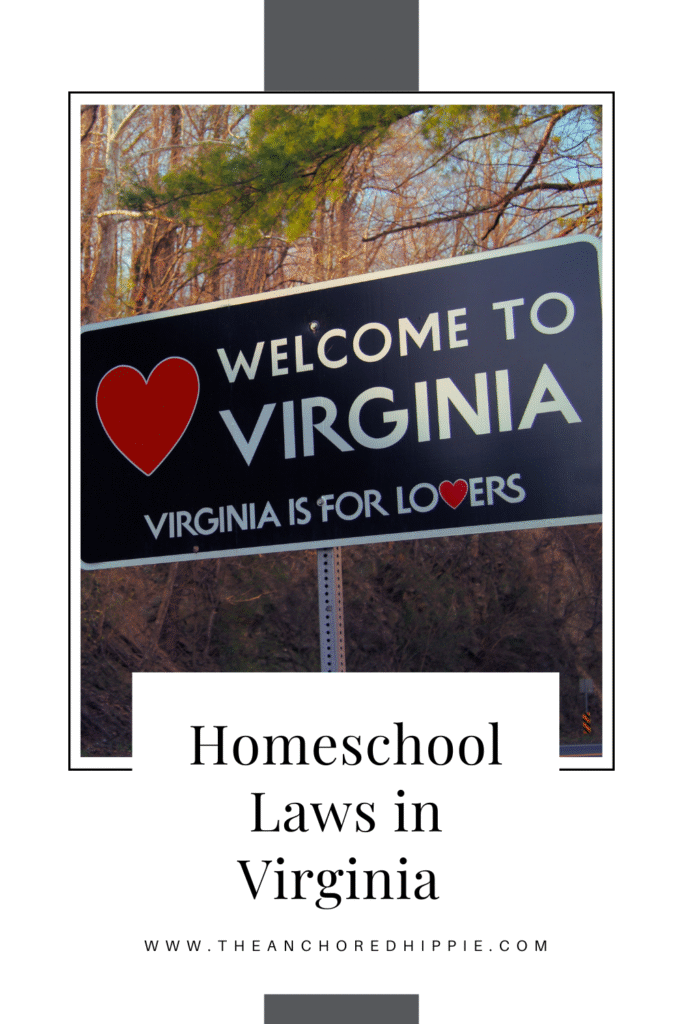Virginia Homeschool Laws: Your Complete Guide to Homeschooling Options in 2025
Virginia Homeschool Laws: Your Complete Guide to Homeschooling Options in 2025
Homeschooling in Virginia offers flexibility, freedom, and a world of choice for parents and children. But it also comes with a responsibility: understanding and following the law. Families across the state handle home education in different ways. Knowing Virginia homeschool laws helps you make the right decisions for your family, avoid stress, and set your child up for success.
It’s always smart to do your own research. Laws about homeschooling can change, and there’s currently a bill that could impact parts of the homeschooling process in Virginia. The information here reflects the law as of January 2025.

Virginia families have four main ways to legally homeschool:
- Home Instruction
- Religious Exemption
- Tutoring by a Certified Teacher
- Private School Option
Groups like Home Educators Association of Virginia (HEAV) and Home School Legal Defense Association (HSLDA) are excellent resources for legal help, forms, and support.
Below, you’ll get detailed insight into each option. Read through, save helpful links, and don’t forget to check the latest updates with your local superintendent or city school system.
Homeschooling Laws in Virginia: What You Need to Know
Virginia law requires all children between ages 5 and 18 to attend school, but homeschooling offers several “paths” to meet this requirement. Each option has its own paperwork, deadlines, and regulations.
Please don’t rely on anyone’s word alone, not even a seasoned homeschooler. Always check state and local resources. Laws can shift, and what was true one year may not be true the next.
Key Homeschooling Options in Virginia:
- Option 1: Home Instruction – Parents teach their children at home after submitting yearly paperwork.
- Option 2: Religious Exemption – Homeschooling based on sincere religious conviction.
- Option 3: Tutoring by a Certified Teacher – A Virginia licensed teacher instructs the child.
- Option 4: Private School Option – Enroll your child in a private school program that allows home-based study.
Find full details, latest forms, and contacts at the HEAV website and the HSLDA Virginia law page.
Homeschooling Option 1: Home Instruction
Home Instruction is the most popular method for following Virginia homeschool laws. Parents direct their children’s education, select curriculum, and handle annual reporting.
Home Instructor Qualifications
You need to meet just one of the following:
- Have a high school diploma or higher degree (Associates, Bachelor’s, etc.)
- Hold a current Virginia teaching license
- Provide a program of study or curriculum from a recognized correspondence school, online school, or distance learning (such as Liberty University Online)
- File a self-written letter showing you can provide an adequate education – This involves writing a short explanation to your district’s superintendent.
Pick the qualification that matches your circumstances. Most parents use their high school diploma, but if not, the self-attestation letter or an accredited online curriculum are valid choices.
Filing the Notice of Intent (NOI)
Every year by August 15th, you’ll need to file a Notice of Intent (NOI) with your school district’s superintendent. This form says you’re homeschooling and lists basic details about your plans.
Important You Should Know:
- If you start mid-year (pull your child out of school after August 15th), file the NOI as soon as you begin homeschooling.
- Email is efficient, but mail works too. Check which your district prefers.
What to Include in the NOI:
- Parent’s name and contact details
- Each child’s name and age or grade
- Homeschooling start date
- Subjects you plan to teach (a general list is fine—think math, English, science)
- The method you qualify under (diploma, license, curriculum, or self-attestation)
- Any additional documentation required by the school district
For templates, check the official HEAV Notice of Intent page.
Step-by-Step NOI Process:
- Review your qualification.
- Complete the NOI form or write your intent letter.
- List all children you plan to homeschool this year.
- Include a general subject outline.
- Email or mail it to your district’s superintendent by August 15th.
- Repeat every school year, or file immediately if switching mid-year.
Missing a deadline could cause problems with your child’s attendance record. Set a reminder every summer.
Proof of Progress and Year-End Evaluation
By the end of the school year, you must show your child is learning. Virginia law requires “proof of progress” each year by August 1st. Several acceptable options exist, and families can pick what fits best.
Ways to Show Progress:
1. Standardized Testing
- Use any nationally-normed achievement test like CAT, Stanford, or Iowa Test.
- Test must show the child scored at or above the 23rd percentile.
- Many local or online companies administer these tests, and you can do them at home or in a group setting.
2. Evaluation Letter from Qualified Person
- An evaluation letter comes from a licensed teacher (from any state) or a person with a master’s degree or higher in an academic field.
- The evaluator reviews samples of your child’s work, portfolio, and may interview your child.
- Each evaluator has a unique approach, from full Zoom meetings and interviews to simple portfolio reviews.
- Families with children who are neurodivergent, unschool, or follow methods like Charlotte Mason or Montessori can find evaluators comfortable with those styles.
Tip: Join the HEAV Facebook group for referrals to the right evaluators.
3. Report Cards or Transcripts
- Submit report cards or transcripts from college, community college, approved correspondence, or distance learning schools.
- If your child is dual enrolled, this option may work well.
4. Superintendent-Approved Evaluation
- Sometimes you may work out another method with the school superintendent—this must be approved ahead of time.
- Most families use one of the other options as this one requires extra steps.
Summary Table: Home Instruction Progress Options
- Standardized test results
- Teacher or master’s degree evaluation letter
- Report card/transcript from approved programs
- Pre-approved alternate assessment with the superintendent
If you don’t submit proof, the school district can revoke your right to homeschool. Stay organized and track your deadlines and documents—future you will thank you.
Personal Note: Many families, including myself, find evaluation letters less stressful than standardized tests. It’s a chance for your child to show growth in a relaxed setting. Choose what feels right for your homeschool rhythm.
Homeschooling Option 2: Religious Exemption
Some Virginia families homeschool because their sincere religious beliefs prevent them from sending kids to traditional or private schools. This path is the Religious Exemption.
How to Apply for Religious Exemption
- Write a letter/application to your school board stating your beliefs.
- Important: This exemption is only for deeply held religious beliefs—not for philosophical, moral, or political reasons.
- All faiths are valid.
- Submit your application to the local superintendent or school board.
- After review, you’ll get an official letter approving or denying your request.
- If approved, you don’t have to file a Notice of Intent or annual proof of progress—though sometimes schools ask you to confirm your status each year.
Helpful Resources:
What Makes Religious Exemption Different
- Once granted, you’re not tied to deadlines for yearly paperwork.
- If the district requests annual renewals, follow their directions.
- Always save approval letters and emails for your records.
This path can get tricky. It’s best to have support from organizations like HEAV or HSLDA. They can guide your paperwork and step in if schools misinterpret the law.
Homeschooling Option 3: Tutoring by a Certified Teacher
Under this option, a certified Virginia teacher provides instruction at home. This person could be a parent or someone hired by your family.
Certified Tutoring Process
- The teacher applies to the district superintendent for approval as a tutor.
- Once approved, the tutor can teach any number of children—including their own—at home.
- Parents using this method don’t have to file a Notice of Intent, and the names of homeschooled children aren’t required in the notification.
This option is perfect for:
- Families with a parent or friend who holds a current Virginia teaching license.
- Small group homeschooling cooperatives wanting a teacher for instruction.
Even though fewer people choose this method, it’s an excellent fit for families that want a classroom feel without traditional schooling.
Homeschooling Option 4: Private School Option
This method is less common but still counts as legal homeschooling under Virginia law.
How the Private School Option Works
- The child is enrolled in a private school but receives instruction at home.
- The home-based setup must follow the private school’s calendar in days, hours, and school year periods—matching local public schools’ attendance requirements.
- Instruction looks a lot like traditional homeschooling, but the child is officially a private school student.
This process is used rarely. It can be complicated, and most families choose one of the other three routes. For further breakdowns and advice, see HEAV’s guides to private school options.
Resources and Virginia Homeschool Support
Virginia has a wonderful network of support for new and seasoned homeschooling families.
- HEAV (Home Educators Association of Virginia) supplies legal forms, conferences, evaluator contacts, and up-to-date law changes.
- HSLDA (Home School Legal Defense Association) provides protection, legal updates, and phone support if conflicts arise.
- Both groups run active Facebook communities with thousands of members sharing advice.
- Save and bookmark the HEAV Notice of Intent form for regular reference.
Connect early with these organizations so you’re never alone if a question or issue pops up.
Frequently Asked Questions about Virginia Homeschool Laws
- What happens if laws change after I file my paperwork?
Your best move is to follow the law in place when you filed, but double-check updates each year before resubmitting forms. Join HEAV or HSLDA for timely alerts. - Can I switch between options in future years?
Yes. For example, you could start with the home instruction option, then move to religious exemption or tutoring if your situation changes. - What if my child wants to return to public school?
Contact your local school beforehand. They might assess your child’s progress, ask for test results, or review your curriculum before placement. - How do I find a licensed evaluator for proof of progress?
Try the HEAV Facebook group or ask your local homeschool network. There are evaluators for every teaching style and child’s need—including those familiar with neurodiversity and alternative education methods. - Do tutors under Option 3 have to report to schools?
Once approved, the tutor isn’t required to list children being instructed. Any changes or questions should go through the superintendent, but paperwork is simpler under this method.
If you have a question not covered here, leave it in the comments or visit the support groups for detailed answers.
Wrapping Up: Confident Homeschooling in Virginia
Homeschooling in Virginia is flexible, but it does require you to pay careful attention to the paperwork and reporting requirements tied to each option. Parents who follow Virginia homeschool laws enjoy the freedom to tailor a child’s education, try new teaching methods, and build a learning lifestyle that fits the whole family.
Use the resources listed here. Stay connected to updates. Talk with other local homeschool parents. Set reminders for those critical dates, keep a folder for important paperwork, and remember: You’re not alone.
Happy homeschooling! If you have questions or want help, drop your thoughts in the comments. And if you found this post helpful, share it with another Virginia family ready to explore homeschooling!
Resources:
